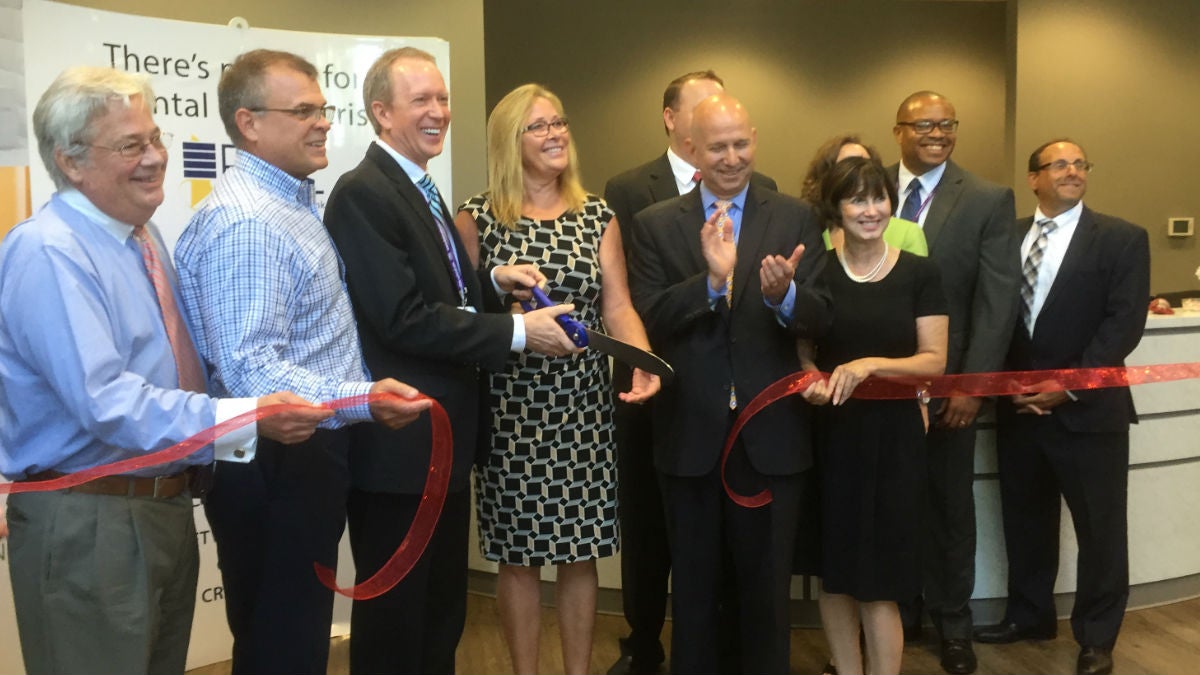Delaware increases access to mental health treatment with Newark facility

(Zoë Read/WHYY)
Delaware is increasing access to behavioral healthcare with a new facility in Newark designed to create a supportive and holistic environment for its clients.
The Department of Health and Social Services hosted the grand opening of the Recovery Response Center in Newark Tuesday.
The department said the new health center is part of an effort to increase behavioral health services and decrease hospital emergency room visits.
“It is somewhere where someone will go, who is in crisis, and they’ll be treated warmly, they will be treated with respect, they will be treated with dignity,” said Michael Barbieri, director of the Department of Substance Abuse and Mental Health.
“They will have a professional who can speak to them and help them sort through what the issues are and identify what might be the best level of care for them.”
The new center, located on E. Chestnut Hill Road in Newark, is operated by RI International, formerly Recovery Innovations. The company was founded 20 years ago to provide a safe and comforting alternative to hospitals, and has locations in several U.S. states.
“Imagine you or your family member being in an acute psychiatric crisis, you’re in distress, and think about what normally happens in our country right now,” CEO David Covington said.
“Could there be an alternative? Something more like a living room than an institution. In addition to psychiatric staff, clinicians and social workers, there are going to be people who have been through similar experiences to your own.”
The 16-bed, 24/7 crisis walk-in center, which started serving clients in July, is similar to the DHSS-funded Recovery Response Center in Ellendale, which opened August 2012 and also is operated by RI International.
About 130 to 150 people are evaluated each month at the Ellendale center, with 80 percent diverted away from hospitalization, according to the health department. There are no other crisis stabilization units in the state.
DHSS will also fund the Newark facility. The facility accepts all insurance types, and if an insurance company doesn’t cover the costs, the Department of Substance Abuse and Mental Health will front the bill.
This year Gov. Jack Markell, D-Delaware, set aside $4 million in his budget for its operation.
“I’ve had plenty of conversations in the past with police officers whose only available response historically has been to handcuff somebody who’s having a crisis and take them wherever they’re taking them, which often is not the ideal place to take them,” Markell said during the ceremony.
“This is an issue that’s affects people form every socioeconomic group, every racial group, every income group and every age group. I think it’s important we have approaches like the one here for our neighbors.”
The Newark location has 28 staff members, including a nurse practitioner who’s either on-site or on-call 24/7 and works under the supervision of RI International’s medical director and psychiatrist. Other staff include mental health professionals, psychiatric nurses and 24-hour security in the building.
More than 50 percent of staff have had their own struggles with mental health or addiction in the past, and are trained as peer support specialists to encourage the clients.
The facility is designed to be the entry point into the mental health system. Clients stay for 23 hours, and staff evaluate them and decide if they can return home, enter an outpatient facility or enter a psychiatric hospital. The system attempts to prevent hospitalization and incarceration.
The facility is created after the “living room” model of behavioral healthcare, a recovery-based environment using staff who have lived experience, as an alternative to traditional medical-based models.
“The living room is to make people feel they are in someone’s living room, like they’re welcome, they want to be there, this is a place of comfort, rather than a stale institutional strict medical hospital model,” said Leon Boyko, chief administrative officer for RI International.
Dr. Gerald Fishman, eastern region crisis director for RI International, said the living room model empowers individuals struggling with mental health disorders and addiction.
“From the moment of entry, to look at the goals, the aspirations and dreams of the patients coming in, you’re really shifting the sense of hope for that guest to believe they are going to improve, be more stable, start planning more rationally toward goals and objectives they find meaningful, as opposed to just a clinician finding meaningful, and it gives them a sense of comfort knowing they are engaged with people with lived experience as well as clinicians,” he said.
“The mix can be very supportive and give them a sense of respect they don’t normally receive in other medical models.”
The facilities also reduce the numbers at emergency rooms, which across the nation, are overrun, Boyko said.
“Our goal is to reduce that burden by taking in these patients with behavioral health crisis’ that we can deal with, that don’t have acute medical issues, that will relieve that burden off the hospital EDs and get people into the right care and get them through the system quickly or access the system they’ve never been involved with before,” he said.
Fishman said emergency rooms also aren’t equipped to handle behavioral health emergencies.
“In the emergency room it’s medication pharmacological treatment, they’re not getting any type of counseling support, they’re not getting any social work support, the engagement is done primarily by medical personal who are quite busy and they’re doing a triage, primarily,” he said.
A large number of referrals at the Newark facility will be from police. The facility has had 50 drop-offs from police since it opened.
In the past, and currently in some parts of the country, individuals facing crisis situations were sent to hospitals, and law enforcement were required to sit with the patient until the hospital found them a room, which can be a few hours—or even a whole shift. The new facility also will lift the burden off law enforcement.
At RI facilities, law enforcement is in and out in five minutes. Police walk through a side entrance, inform staff of the issue and leaves.
Fishman said the new approach to mental health will have a significant impact on Delaware.
“There is an approach to mental health and substance abuse disorder treatment that is sensitive, it’s compassionate, it’s evidence-based and has outcomes that will reduce people cycling back through systems, whether it’s the criminal justice system, hospital system or the mental health system itself,” he said.
“Many of the folks that were looked upon has having no hope will come out of a treatment approach and will bring with them a sense of hope, an ability to achieve goals, be contributing tax payers, to be assets in their communities, that other systems haven’t been able to get them to achieve.”
WHYY is your source for fact-based, in-depth journalism and information. As a nonprofit organization, we rely on financial support from readers like you. Please give today.





